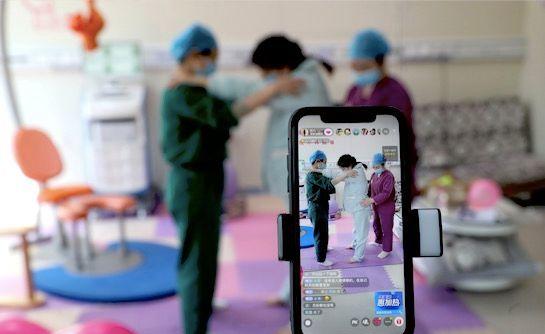
As a patient, how would you feel if you found yourself on a doctor's livestream while stating your condition at the doctor' appointment? Recently, according to the "Rule of Law Daily", Sun Ting (pseudonym), a middle-level manager of a well-known hospital in China, is worried about more and more peers around her investing in live broadcasting. Some patients also have doctor-patient disputes due to the doctor's live broadcast in the clinic, and call the "12345" service convenience hotline to complain about the hospital. In Sun Ting's view, there may be legal risks such as infringement of patients' privacy rights behind this, which will bring certain hidden dangers to hospital management.
In many hospitals, patient-doctor communication takes place in relatively enclosed spaces. Such a medical environment allows patients to unload their defenses when talking about their illness. The diagnosis and treatment environment without external interference is also conducive to doctors to concentrate on judging patients' symptoms and providing patients with a better medical experience. However, live broadcasting may break the privacy of patients' medical treatment, and even if many doctors seem to carefully mark the patient's face during the live broadcast, it will still make the patient feel uncomfortable. The instant interaction between doctors and netizens may bring an "immersive experience" to onlookers, but frequent live broadcast answers to questions may distract the doctor's energy from on-site diagnosis and treatment, so that patients on the side feel that the doctor is absent-minded and perfunctory.
According to the provisions of the latest version of the Law of the People's Republic of China on Physicians, doctors should not only respect, care for and care for patients, protect patients' privacy and personal information in accordance with the law, but also publicize and promote health science knowledge suitable for their posts, and conduct health education and health guidance for patients and the public. The issues involved in the above reports are related to whether doctors can handle the boundary relationship between professional diagnosis and treatment and health science popularization. If doctors are not proficient in the use of emerging means of communication, it is not conducive to expanding their own contact channels with patients, and they cannot provide the telemedicine services advocated by the state well. However, if you cannot respect the privacy of patients, or even sell goods in the live broadcast room, it will not only hurt the patient's feelings, conflict with the hospital's management system, but also may violate the doctor's professional ethics and medical norms, breeding many medical chaos.
Doctors entering the live broadcast room is only a new form of health science popularization, and in the past, a large number of doctors have participated in newspaper interviews, TV program dialogues, and community health knowledge promotion activities. In such activities, many doctors, out of careful consideration, often remind the majority of patients not to listen to biased beliefs and "try to go to regular medical institutions for medical treatment." This kind of "risk warning" type of information often tells patients to seek medical treatment according to their own diseases, and also reflects the doctor's sense of professional responsibility. However, some undifferentiated diagnosis and treatment plans appear directly in the live broadcast room, which may not take into account the individual differences of patients, resulting in misdiagnosis and delayed treatment of patients. If doctors promote certain types of drugs in order to monetize traffic, they may violate the restrictions on medical advertising under the Advertising Law and aggravate the occurrence of medical risks.
After being injured and healed, Ophthalmologist Tao Yong once showed a doctor's thinking on the doctor-patient relationship, disease and death by publishing books or participating in programs and blog interactions, which narrowed the distance between doctors and patients and made an example for health science popularization. For doctors, popularizing medical and health knowledge in this field to the public through live broadcasting is of great benefit to balancing high-quality medical resources and improving public medical health literacy.
However, in the live broadcast room, doctors must abide by professional norms, protect the privacy of offline patients, and handle the relationship between diagnosis and treatment and science popularization, and follow medical ethics and abide by the legal bottom line in words and deeds. If you spend too much energy on live broadcasting, or are keen to broadcast live during working hours, it may interfere with your own work. If this misleads the audience, it will bear the corresponding legal responsibility. For many video platforms that provide live medical science broadcasts, it is also necessary to strictly verify the professional qualifications of doctors in accordance with national laws and regulations, standardize their interactive question-and-answer behavior, and better promote the popularization of public health knowledge.
Source: China Youth Daily client